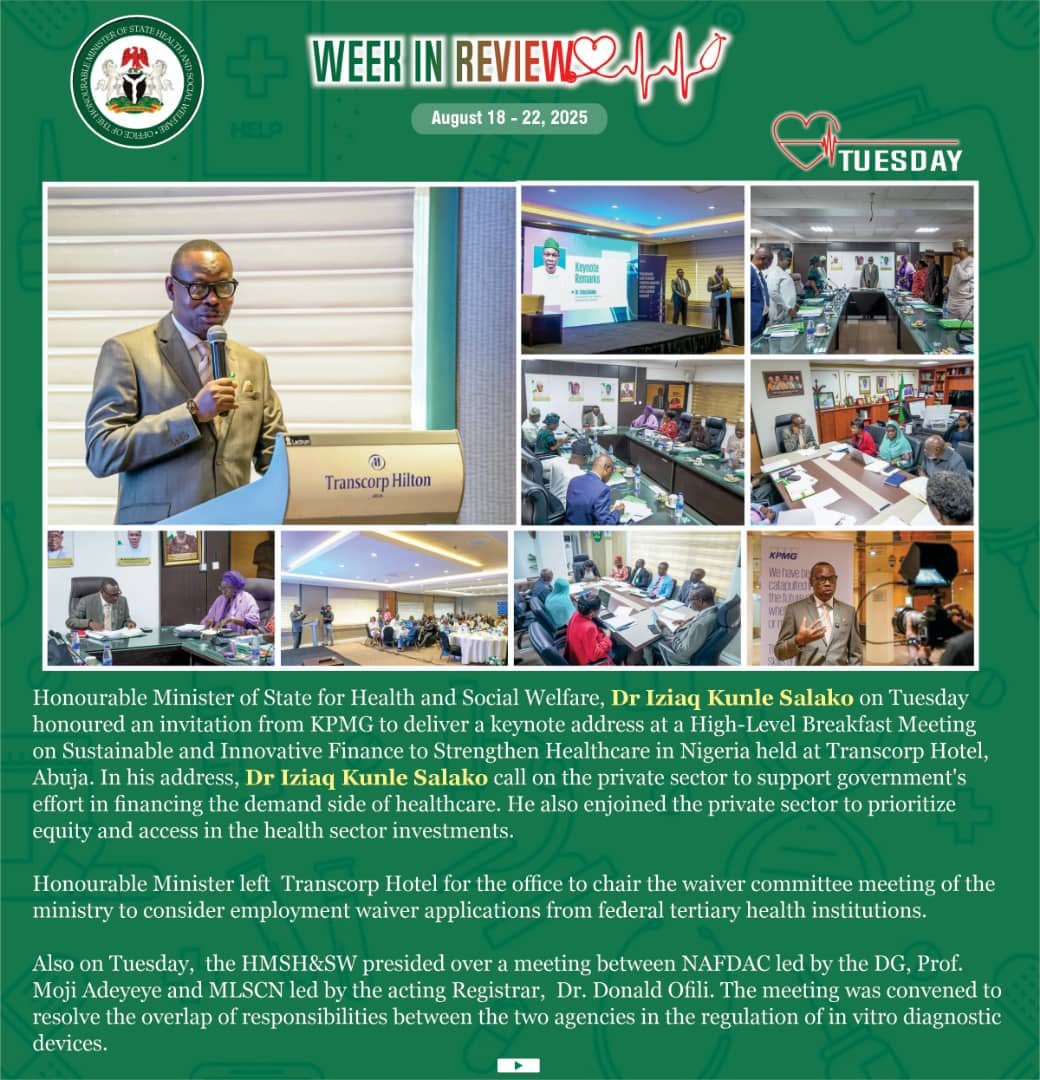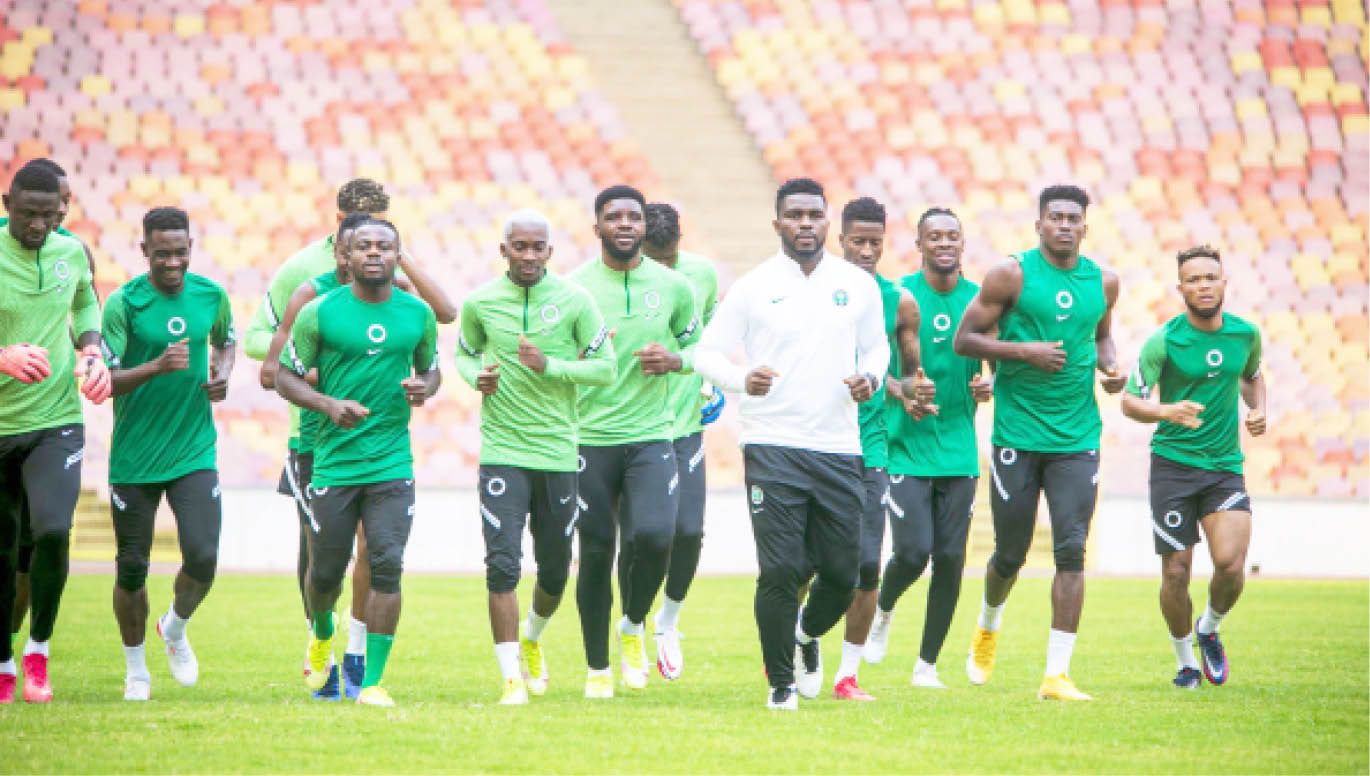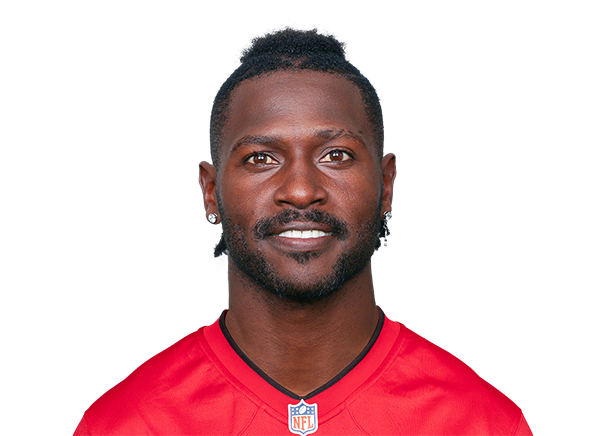
Powering Health for All Nigerians: A Week of Bold Moves by Dr. Iziaq Kunle Salako

It has been a week of decisive action, innovation, and far-reaching commitments for Dr. Iziaq Kunle Salako, Nigeria’s Minister of State for Health and Social Welfare, whose activities over the past days underscore a relentless drive to transform the nation’s health sector into one that is more resilient, people-centered, and future-ready. Each day carried with it a new initiative, a critical conversation, or a strategic intervention, all tied together by one clear message: the Nigerian health system is being reimagined for efficiency, equity, and sustainability.
The week opened on Monday with a strong emphasis on partnerships and leadership when Dr. Salako received a high-powered delegation from DP World, a global leader in logistics. The conversation focused on healthcare logistics, a critical but often under-discussed pillar of effective health delivery. From ensuring that essential medicines and vaccines are transported safely and reach even the remotest communities, to making sure that supply chains are robust enough to withstand shocks, the talks with DP World signaled a new openness to leveraging international expertise for local impact. That same day, Dr. Salako also chaired a pivotal meeting with the Chief Medical Directors and Managing Directors of Federal Tertiary Hospitals, setting the tone for greater accountability, improved service delivery, and renewed focus on the needs of patients across Nigeria.
By Tuesday, the pace only quickened as the Minister delivered a keynote address at KPMG’s High-Level Breakfast on innovative health financing. In a country where out-of-pocket payments still dominate health spending, his call for innovative financing models was not just timely but urgent. From public-private partnerships to exploring alternative sources of funding, the vision is to ensure that no Nigerian is denied healthcare because of financial barriers. Later that day, he chaired the waiver committee, streamlining decision-making processes that often bog down healthcare progress, and then moved on to resolve long-standing regulatory overlaps between the National Agency for Food and Drug Administration and Control (NAFDAC) and the Medical Laboratory Science Council of Nigeria (MLSCN). These regulatory bottlenecks have for years frustrated stakeholders, slowed down approvals, and caused duplication of responsibilities. Dr. Salako’s intervention reflected a commitment to clear coordination, ensuring that agencies work in harmony rather than at cross purposes.
Wednesday offered no slowdown, even though it was dedicated largely to policy reviews, memos, and high-level office engagements. While such days may not grab headlines, they are the bedrock of effective governance. Policy documents were scrutinized, strategies fine-tuned, and decisions aligned with broader national goals. It was a day of building the unseen frameworks that will eventually translate into tangible reforms.
On Thursday, the spotlight turned to a critical but often overlooked aspect of healthcare—complementary and alternative medicine. At a crucial meeting convened by the Minister, plans were laid out for the revitalization of the Federal College of Complementary & Alternative Medicine (FEDCAM). With a firm directive to ensure the college achieves full functionality by December 2025, Dr. Salako signaled that Nigeria cannot afford to leave any avenue unexplored in the quest for a holistic and inclusive healthcare system. Complementary and alternative medicine has deep cultural roots in Nigeria, and revitalizing FEDCAM could help integrate traditional practices with modern medicine, ensuring safety, regulation, and scientific validation while respecting local knowledge systems.
Friday, however, was perhaps the most visible day of the week as Dr. Salako featured on NTA’s flagship programme, Good Morning Nigeria. There, he highlighted one of the most transformative recent initiatives in the health sector—the Renal Dialysis Subsidy Programme. In a nation where kidney-related illnesses have driven thousands of families into financial distress, the news that dialysis costs have been slashed by 80% across nine tertiary hospitals was met with widespread relief and applause. This subsidy represents not just financial relief but also renewed hope for patients and families battling chronic kidney disease. Later in the day, he met with labour unions, underscoring the importance of workplace harmony and ensuring that the health sector is not derailed by disputes or avoidable disruptions. Dialogue with labour representatives reinforced his philosophy that healthcare delivery is not only about infrastructure and policies but also about the people—the doctors, nurses, and allied workers—who make the system run.
Taken together, the engagements of this week reflect a broader mission to build a resilient and equitable health system that puts people first. From logistics to financing, from policy reviews to alternative medicine, from patient relief to labour harmony, every move pointed towards a comprehensive reimagining of how Nigeria delivers health to its citizens. What stands out is the balance between high-level strategic thinking and direct interventions that touch ordinary lives, such as the dialysis subsidy. This is governance that speaks both the language of boardrooms and the language of communities.
As preparations intensify for the forthcoming National Stakeholders’ Dialogue on Power in the Health Sector, scheduled for September 9–10 in Abuja, Dr. Salako’s week serves as a preview of the momentum building within the Ministry of Health and Social Welfare. The dialogue is expected to bring together stakeholders from across the country to confront one of the biggest challenges undermining healthcare delivery—power supply. Hospitals without reliable electricity cannot function effectively; patients cannot be treated safely; equipment cannot run without interruption. The fact that the Ministry is placing power squarely on the agenda signals a recognition that solving Nigeria’s health challenges requires thinking beyond medicine and looking at infrastructure, energy, and governance holistically.
The hashtags that trailed the week’s activities—#HealthyNaija, #PoweringHealth, #HealthForAll—are more than catchy slogans. They embody a vision of a country where healthcare is not a privilege for the few but a right guaranteed for every Nigerian. They reflect a push for sustainability, resilience, and inclusivity in health policy and practice. They also serve as a rallying call for citizens, stakeholders, and partners to contribute to the collective mission of strengthening Nigeria’s health sector.
Ultimately, this week was not about isolated events but about weaving a consistent narrative of progress, accountability, and innovation. It was about a Minister of State who is not waiting for change to trickle down but is actively driving it from the top, while ensuring it reaches the grassroots. It was about reminding Nigerians that even in the face of daunting challenges, there is room for solutions, space for hope, and opportunity for transformation. And as Dr. Iziaq Kunle Salako closed the week and looked ahead to the critical stakeholders’ dialogue, one thing was clear: the health sector is moving forward with purpose, and the journey toward a healthier, more equitable Nigeria has truly begun.


